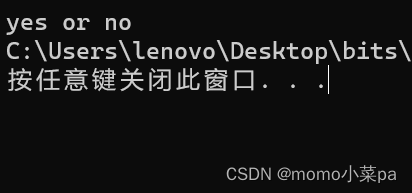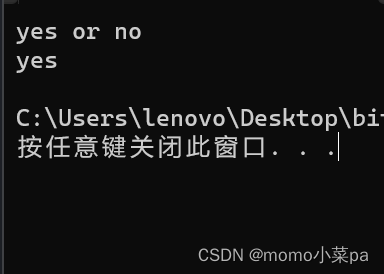热门标签
热门文章
- 1SpringBoot热部署2023最新版IDEA详细步骤_idea2023 热部署
- 2轻量化卷积神经网络:SqueezeNet、MobileNet、ShuffleNet、Xception_squeezenet1.0 mobilenet v1 shufflenet1 xception ef
- 3[送10个成品账号]狙击GPT5?Claude3免费体验方法及初步体验_claude 3 免费
- 4AIGC查重高怎么降:七步走向原创内容
- 5conda 的一些操作_进入nlp虚拟环境的命令是
- 6微调Llama 2 和Mistral
- 7yolo-nas无人机高空红外热数据小目标检测(教程+代码)_无人机红外行人检测数据集
- 8一篇文章助你了解机器学习
- 9MATLAB拟合函数
- 10Maven是什么? Maven的概念+作用
当前位置: article > 正文
C语言--strcmp函数,strcat函数,strcpy函数详解及实现
作者:weixin_40725706 | 2024-04-08 21:20:56
赞
踩
strcmp
目录
1.strcmp函数
1.1函数介绍
strcmp函数是用来比较两个字符串大小的函数,需要引用头文件<string.h>。
int strcmp ( const char * str1, const char * str2 );strcmp比较两个字符串的大小,一个字符一个字符比较,按ASCLL码比较
标准规定:
第一个字符串大于第二个字符串,则返回大于0的数字
第一个字符串等于第二个字符串,则返回0
第一个字符串小于第二个字符串,则返回小于0的数字
1.2函数使用
1.2.1代码
- #include<stdio.h>
- #include<string.h>
- int main()
- {
- char* p1 = "abcdefgh";
- char* p2 = "abcdefgh";
- char* p3 = "abcde";
- char* p4 = "bcdef";
- printf("%d\n", strcmp(p1, p2));
- printf("%d\n", strcmp(p1, p3));
- printf("%d\n", strcmp(p3, p4));
- }
1.2.2运行结果

1.3模拟实现strcmp
1.3.1实现思路
1.函数所接收的值只用于比较,不能被修改,因此要对参数进行const修饰,由于传入参数都不能为空,因此可以加用断言。
2. strcmp是比较字符串中对应位置上的字符大小(ASC II码值大小),如果相同,就比较下一对,直到不同或者都遇到'\0'。
3.若str1和str2解引用后不相等,则返回*str1-*str2。
1.3.2代码
- #include<stdio.h>
- #include<assert.h>
- int my_strcmp(const char* str1, const char* str2)
- {
- assert(str1 && str2);
- while (*str1 == *str2)
- {
- if (*str1 == '\0')
- {
- return 0;
- }
- str1++;
- str2++;
- }
- return(*str1 - *str2);
- }
- int main()
- {
- char* p1 = "abcdefgh";
- char* p2 = "abcdefgh";
- char* p3 = "abcc";
- char* p4 = "bcde";
- printf("%d\n", my_strcmp(p1, p2));
- printf("%d\n", my_strcmp(p1, p3));
- printf("%d\n", my_strcmp(p3, p4));
- }

1.3.3运行结果

2.strcat函数
2.1函数介绍
strcat追加拷贝,追加到目标空间后面,目标空间必须足够大,能容纳下源字符串的内容。
char * strcat ( char * destination, const char * source );2.2函数使用
2.2.1代码
- #include<stdio.h>
- #include<string.h>
- int main()
- {
- char str1[20] = "yes or";
- const char* str2 = " on";
- strcat(str1, str2);
- printf("%s\n", str1);
- return 0;
- }
2.2.2运行结果

2.3模拟实现strcat
2.3.1实现思路
1.目的在字符串dst的末尾接上src的开头。
2.因此首先让dst指向'\0',让src从'\0'开始赋值给dst
2.3.2代码
- #include<stdio.h>
- void MyStrcat(char* dst, const char* src)
- {
-
- while (*dst != '\0')
- {
- ++dst;
- }
-
- while (*dst = *src)
- {
- ++dst;
- ++src;
- }
- *dst = '\0';
- }
- int main()
- {
- char p1[20] = "yes or";
- const char* p2 = " no";
- MyStrcat(p1, p2);
- printf("%s\n", p1);
- return 0;
- }

2.3.3运行结果

3.strcpy函数
3.1函数介绍
strcpy是覆盖拷贝,将source全覆盖拷贝到destination,会把’\0’也拷过去,且必须考虑destination的空间够不够(destination的空间必须>=source的空间)
char * strcpy ( char * destination, const char * source );3.2函数使用
3.2.1代码
- #include<stdio.h>
- #include<string.h>
- int main()
- {
- char p1[] = "yes or no";
- char* p2 = "yes";
- printf("%s\n", p1);
- strcpy(p1, p2);
- printf("%s\n", p1);
- return 0;
- }
3.2.2运行结果

3.3函数模拟实现strcpy
3.3.1实现思路
我们目的是将source覆盖拷贝到destination,那么我们可以从头开始将source的值,赋给destination,赋值结束后只需要给destination后一个位置加上'\0'就完成了。
3.3.2代码
- #include<stdio.h>
- void my_strcpy(char* dst, const char* src)
- {
- while (*src)
- {
- *dst = *src;
- ++src;
- ++dst;
- }
- *dst = '\0';
- }
- int main()
- {
- char p1[] = "yes or no";
- const char* p2 = "yes";
- printf("%s\n", p1);
- my_strcpy(p1, p2);
- printf("%s\n", p1);
- return 0;
- }

3.3.3运行结果

声明:本文内容由网友自发贡献,不代表【wpsshop博客】立场,版权归原作者所有,本站不承担相应法律责任。如您发现有侵权的内容,请联系我们。转载请注明出处:https://www.wpsshop.cn/w/weixin_40725706/article/detail/388276
推荐阅读
相关标签


